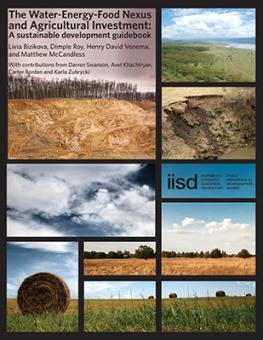
Water-Energy-Food Nexus and Agricultural Investment: A sustainable development guidebook
The nexus between water, energy and food (WEF) security is a critical component of human well-being, and billions of dollars are spent annually on investments intended to ensure that it is adequately addressed.
A central concept throughout this guidebook is that the rural poor (i.e., those who benefit most from investments in agricultural productivity) will fare best if the underlying environmental determinants of water, energy, and food security—the WEF nexus—are protected and enhanced.
The purpose of this guidebook is to provide a practical, spatially explicit, ecosystem-based framework for the design and management of land investments that deliver increased water, energy and food security. It also provides an implementation-oriented means of operationalizing an otherwise theoretical concept highlighted as a significant global risk and opportunity for integration. This publication is aimed primarily at those involved in strategic planning and allocation of domestic and foreign investments as well as international agencies supporting or evaluating investments in other countries.
This document provides specific guidance structured around four mains steps: 1) Assessing the WEF Security system; 2) Envisioning future landscape scenarios; 3) Investing in a WEF-secure future; 4) Transforming the system. This guidebook provides specific goals, approaches and tools as well as illustrative examples for these main steps for implementation of an inclusive process for optimizing WEF security.
You might also be interested in
The Case of Eco-Certification in Manitoba's Commercial Fisheries
Manitoba commercial fisheries stand to benefit from obtaining eco-certification.
Good COP? Bad COP?: Food systems at COP29
The 29th United Nations Climate Conference (COP 29) in Baku failed to build on the notable progress made on food systems at COP 28. However, it wasn't all doom and gloom.
Addressing Soil Acidity and Enhancing Soil Health
This policy report addresses the critical issue of soil acidity in the East African Community (EAC) and provides actionable recommendations for EAC partner states, the EAC Secretariat, and other relevant stakeholders.
The Responsible Agricultural Investment Tool for Agribusiness and Case Studies
This report summarizes a collaboration to support agribusinesses in complying with principles of responsible investment in agriculture and food systems.